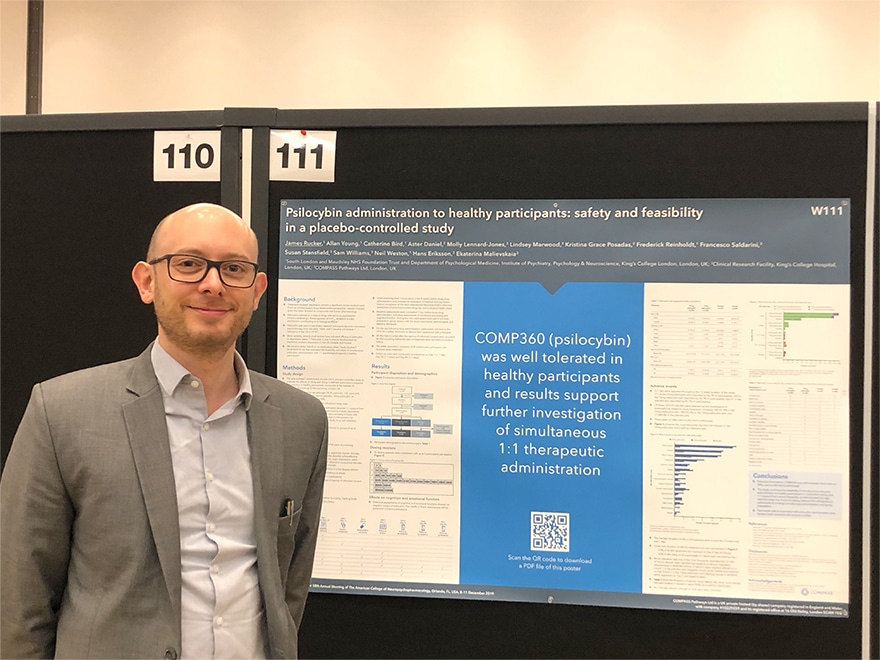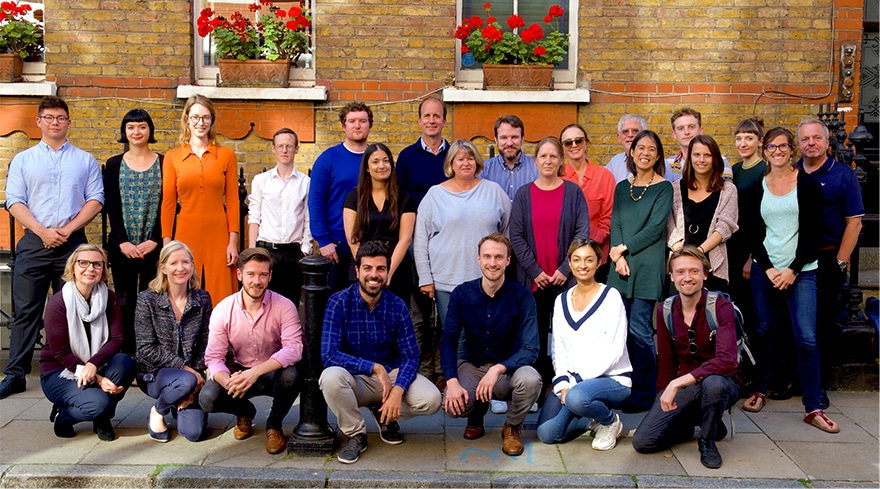Dear all
The Compass family has grown. Our Christmas party this year was a large, noisy and joyful occasion – and as our team, advisers, partners, investors and supporters chatted, I felt deeply grateful to all of you who have trusted our intentions, vision and skills, were generous with your time and expertise, and joined us as we work to transform mental health care.
It feels good to have reported our first clinical data from our healthy volunteers study, at the annual meeting of the ACNP (American College of Neuropsychopharmacology) in December. In addition to creating regulatory quality data on the short- and long-term safety of psilocybin, we explored the safety and feasibility of 1:1 therapeutic support with several simultaneous sessions. If further supported by regulators, this model could expedite research and eventually improve patient access to innovative treatments. The healthy volunteers study was completed in less than a year, an accomplishment made possible by the dedicated team at the Institute of Psychiatry, Psychology & Neuroscience at Kings College London.

Our core clinical program of psilocybin therapy in treatment-resistant depression is progressing well. We now have 18 sites actively recruiting patients, across Europe and North America. In addition, a number of investigator-initiated studies for other indications of significant unmet need have received regulatory approval and will start in 2020. We have learned, and continue to learn, a huge amount about running regulated clinical trials with psychoactive substances. This includes best practice around manufacturing and handling a scheduled substance; therapist training; patient recruitment; and psychological support and care.
It’s not easy for patients with mental illness to demand an increase in research funding and equitable access to mental health care – these patients need advocates. This year we partnered with the US Depression and Bipolar Support Alliance (DBSA), a peer-support advocacy organisation, to better understand the realities and needs of patients living with depression and other mood disorders. It was a highlight of the year for me to participate in a joint meeting of the DBSA and the FDA (US Food and Drug Administration) on patient-preferred outcomes and their role in the regulatory decision process. With the emergence of a new class of psychoactive rapid-acting antidepressants, such as esketamine and psilocybin, established methodology and existing psychiatric scales might not be able to reflect the real value these new treatment paradigms create for patients, families and health systems. To understand this better, we look forward to working closely with regulators, researchers and patient groups on these and similarly challenging questions in the new year.
It’s been a tremendous year for the field of psychedelic science. We have seen psilocybin therapy becoming more widely known and accepted: new psychedelic research centres have been established at Imperial College London and Johns Hopkins University, with combined pledges of over $20m; and new conferences of the International Society of Research in Psychedelics and European MIND Foundation have launched with great success. We were delighted to see that, a year after we received Breakthrough Therapy designation for our psilocybin therapy for treatment-resistant depression, the FDA granted another Breakthrough Therapy designation for psilocybin, this time in major depression to Usona Institute. This highlights the regulatory support for new approaches to caring for patients suffering with depression. Just last month we had a thoughtful and constructive four hour consultation with the European Medicines Agency (EMA) and European payors (EUnetHTA – European Network for Health Technology Assessment) on the evidence required for psilocybin therapy to be reimbursed and integrated into national health systems, so all patients in need can access it regardless of their ability to pay. The outcomes of our conversations with patient advocacy groups, regulators and payors will further inform our clinical development programme for the next few years.
This year we have also witnessed the growth of interest in psilocybin from entrepreneurs and investors. According to LinkedIn, there are now more than 300 new companies and platforms in the psychedelic space, mostly focusing on recreational consumer-oriented markets. As the field grows, the division between recreation and medical use will become clearer as these different models require different resource and funding, skills and risk tolerance. Our business development team has been hard at work, looking at investment and partnership opportunities outside of our current programmes, with a focus on ideas that offer transformative treatments and new models of patient care. The most successful decriminalisation and legalisation efforts are unlikely to make a dent in the mental health crisis we are facing. The research in new therapeutic targets and novel treatments will continue within the constraints of the current regulatory and healthcare systems. For the first time in decades, psychiatry has a real shot at having approved treatments that not only alleviate the symptoms, but empower patients, and we simply cannot afford to miss that chance.
And so to 2020. Next year we aim to complete our phase IIb clinical trial of psilocybin therapy for treatment-resistant depression, and to analyse and report results from over 20 pre-clinical and early phase clinical studies.
Most importantly, we will also focus on developing our strategic academic and business partnerships, and sponsored research, to create clinical research centres with deep experience and understanding of psychedelic science and therapy. I hope that 2020 will be the start of the decade in which we see a real transformation in mental health care and come closer to our vision of a world of mental wellbeing.

We wish you and your loved ones all the very best for the holidays and the New Year. As always, please share your reflections, ideas and questions with us.
With warm holiday wishes,
Ekaterina

